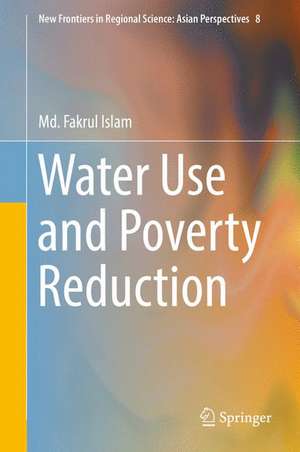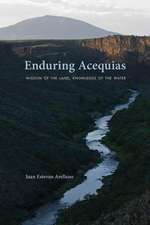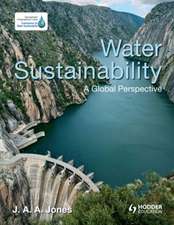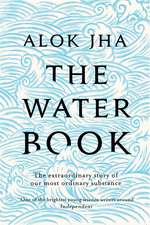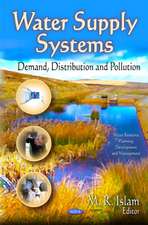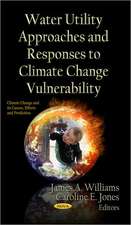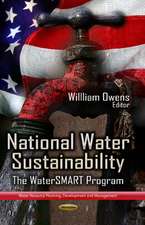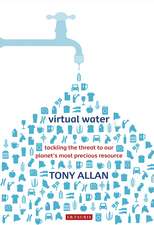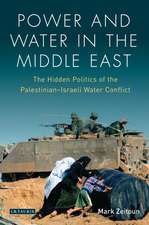Water Use and Poverty Reduction: New Frontiers in Regional Science: Asian Perspectives, cartea 8
Autor Md. Fakrul Islamen Limba Engleză Hardback – 6 iun 2016
| Toate formatele și edițiile | Preț | Express |
|---|---|---|
| Paperback (1) | 550.34 lei 39-44 zile | |
| Springer – 7 iun 2018 | 550.34 lei 39-44 zile | |
| Hardback (1) | 644.18 lei 3-5 săpt. | |
| Springer – 6 iun 2016 | 644.18 lei 3-5 săpt. |
Din seria New Frontiers in Regional Science: Asian Perspectives
- 15%
 Preț: 652.64 lei
Preț: 652.64 lei - 18%
 Preț: 742.00 lei
Preț: 742.00 lei - 15%
 Preț: 645.96 lei
Preț: 645.96 lei - 18%
 Preț: 798.18 lei
Preț: 798.18 lei - 18%
 Preț: 728.74 lei
Preț: 728.74 lei - 18%
 Preț: 724.14 lei
Preț: 724.14 lei - 18%
 Preț: 733.33 lei
Preț: 733.33 lei - 15%
 Preț: 693.25 lei
Preț: 693.25 lei - 15%
 Preț: 640.06 lei
Preț: 640.06 lei - 15%
 Preț: 702.87 lei
Preț: 702.87 lei - 15%
 Preț: 718.61 lei
Preț: 718.61 lei - 18%
 Preț: 786.36 lei
Preț: 786.36 lei - 18%
 Preț: 1110.72 lei
Preț: 1110.72 lei - 18%
 Preț: 787.78 lei
Preț: 787.78 lei - 15%
 Preț: 699.45 lei
Preț: 699.45 lei - 18%
 Preț: 897.47 lei
Preț: 897.47 lei - 15%
 Preț: 643.34 lei
Preț: 643.34 lei -
 Preț: 395.25 lei
Preț: 395.25 lei - 18%
 Preț: 892.42 lei
Preț: 892.42 lei -
 Preț: 386.39 lei
Preț: 386.39 lei - 24%
 Preț: 594.43 lei
Preț: 594.43 lei - 18%
 Preț: 900.31 lei
Preț: 900.31 lei - 15%
 Preț: 714.02 lei
Preț: 714.02 lei - 15%
 Preț: 698.62 lei
Preț: 698.62 lei - 24%
 Preț: 632.82 lei
Preț: 632.82 lei - 18%
 Preț: 1244.59 lei
Preț: 1244.59 lei - 15%
 Preț: 644.63 lei
Preț: 644.63 lei - 18%
 Preț: 785.42 lei
Preț: 785.42 lei - 15%
 Preț: 639.73 lei
Preț: 639.73 lei -
 Preț: 357.81 lei
Preț: 357.81 lei - 18%
 Preț: 1111.53 lei
Preț: 1111.53 lei - 18%
 Preț: 721.33 lei
Preț: 721.33 lei
Preț: 644.18 lei
Preț vechi: 757.85 lei
-15% Nou
Puncte Express: 966
Preț estimativ în valută:
123.27€ • 131.81$ • 102.77£
123.27€ • 131.81$ • 102.77£
Carte disponibilă
Livrare economică 27 martie-10 aprilie
Preluare comenzi: 021 569.72.76
Specificații
ISBN-13: 9784431551713
ISBN-10: 4431551719
Pagini: 200
Ilustrații: XXIX, 171 p. 71 illus., 64 illus. in color.
Dimensiuni: 155 x 235 x 15 mm
Greutate: 0.52 kg
Ediția:1st ed. 2016
Editura: Springer
Colecția Springer
Seria New Frontiers in Regional Science: Asian Perspectives
Locul publicării:Tokyo, Japan
ISBN-10: 4431551719
Pagini: 200
Ilustrații: XXIX, 171 p. 71 illus., 64 illus. in color.
Dimensiuni: 155 x 235 x 15 mm
Greutate: 0.52 kg
Ediția:1st ed. 2016
Editura: Springer
Colecția Springer
Seria New Frontiers in Regional Science: Asian Perspectives
Locul publicării:Tokyo, Japan
Public țintă
ResearchCuprins
Ch 1 Identification Of the Problem.- Ch 2 The Teesta River and Its Basin Area.- Ch 3 The Field Survey: A Comparative Socio-Economic Survey on the Dalia and Gazoldoba Areas.- Ch 4 Indicators and Principles of International Water Sharing.- Ch 5 Different Approaches to International Water Sharing Issue.- Ch 6 Bilateral Water Sharing Model.- Ch 7 Recommendations.
Textul de pe ultima copertă
This book is the outcome of empirical research on the sharing of water of the Teesta River, which flows through India and Bangladesh. The main purpose is to show how regional cooperation between India and Bangladesh regarding sharing of Teesta River water can ensure optimal benefits for people living in the area of the Teesta Basin located in the two countries. The author takes an interdisciplinary approach focusing on the relationship between availability of water and the reduction of poverty in the Teesta Basin as a whole. The book presents findings of a comparative socioeconomic survey on the Dalia and Gazoldoba irrigable areas, with background information on the Teesta River and its origin, spatio-physical nature, geomorphic and hydrological characteristics, irrigation and water delivery system through the Gazoldoba barrage in India and the Dalia barrage in Bangladesh. Citing the principles of transboundary freshwater sharing, this work focuses on different approaches to international water sharing and introduces an optimal approach to dry season water sharing and welfare maximization by developing a bilateral water sharing model. The model is tested through computer simulation, and an alternative water allocation policy is proposed. Water Use and Poverty Reduction is highly recommended to readers who seek an optimum solution to transboundary and bilateral water sharing and poverty reduction issues.
Caracteristici
Presents a valuable resource, with its interdisciplinary character, for courses in environmental science, social work, and policy studies Provides a base for relating poverty to international water sharing Serves as an example of appropriate application of modern methods and techniques of scientific social research Includes supplementary material: sn.pub/extras
